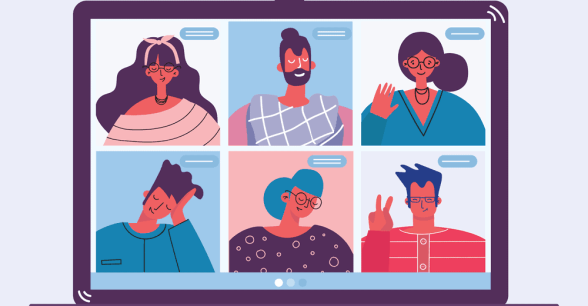Before You Offer Unsolicited Mental Health Advice on Social Media, Read This.
If you have a mental illness and you talk about it on the internet, someone is bound to respond almost immediately with unsolicited advice. Have you tried medication? Have you tried not taking medication? Meditation? Crystals? Yoga? A fad diet? “Cure evangelism” is a popular occupation on the internet, with adherents convinced that they have all the answers to your healthcare needs — regardless of their qualifications, whether they’ve spent any time with you, or if you even asked for their help.
“I don’t normally do this, but…” someone says to me at least once a week, messaging me to tell me all about how I should be managing my mental health. Even if I explicitly say I’m not asking for advice, people provide it anyway.
This makes it tough to be open about mental health, and to have good conversations that reduce stigma by helping people feel less alone. Sometimes I want to make a comment on social media about a tough day or a weird self-discovery and I have to weigh whether I’m really prepared to deal with the inevitable subsequent tide of “helpful advice.” Choosing silence hurts mentally ill people who might otherwise see themselves reflected in frank talk about living with mental health conditions, and it keeps mental illness a mysterious, ominous thing instead of a reality for millions of people.
I talked to several other people who are openly mentally ill on the internet about how they cope with unsolicited advice.
I rarely respond to people, especially strangers, popping up to tell me what to do, and I mute or block them on subsequent offenses. That said, it’s important to understand that while “don’t feed the trolls” is advice that works for some people in some circumstances, it’s not for everyone — and if it’s not for you, that’s okay! You shouldn’t feel bad about choosing to engage with them, whether you’re clapping back or using it as a teachable moment, and your decision to respond to some people and not others is also valid.
“I had to learn to put myself first, and to not pick up baggage that is not mine,” says Jess, who is very selective about engagement with cure evangelists. “It’s their own stuff, I don’t need them to save me, I didn’t ask for their input and so I am under no obligation to engage in it.” Instead, Jess focuses on offering solicited advice to people reaching out to her for help.
Val, who has bipolar II, prefers a firm dismissal when faced with tips from strangers. “I’ve found the most effective response to be: ‘I’m under the care of excellent medical professionals and we’ve decided that medication and therapy are the best route for me.’” This to-the-point reminder about boundaries and privacy is a good one. You could even take it a step further: “Thanks for your interest, but the management of my health is a private matter.”
Some people, like Becky, use a “bury them in science” technique, responding to helpful advice with a dose of evidence-based information. “I teach molecular biology, so when someone tries to tell me to use yoga or mindfulness or goji berries to cure my depression, I start explaining to them how SSRIs work. With diagrams of synapses, if possible. I also start talking about genetic variations in MTHFR, but I don’t abbreviate it; being able to rattle off ‘methylene tetrahydrofolate reductase’ without pausing seems to really unsettle them.”
ace ratcliff frequently ignores would-be helpers in their mentions, but when they do educate, it’s often for the benefit of people reading the thread, not necessarily the person making clueless comments. “I’ve found that engaging with it does very little except make me extremely irate. If I’m in a good spot where I have energy to spare, I might reply to them with a clear correction and a link to supporting evidence — I always assume someone might come along and have the same incorrect mindset about something and might quietly learn something in the background.”
Fighting internet cure evangelism doesn’t just extend to mental health — pretty much every disabled person is familiar with being deluged by “help” when they mention health issues or other concerns online. If you want to fight the trend, start by not contributing to it yourself. If you’re tempted into a “I don’t usually do this, but…” ask yourself whether you think this person has heard this advice before, whether you’re familiar with this person’s medical record and history, and whether this person is talking in a way that suggests they want advice.
Also, don’t be afraid to intervene when you see it happening to someone who explicitly welcomes such assistance. Either ask before stepping in (“Do you want me to take this one?”) or take note when people comment about whether they are comfortable with getting support from people in incidents like this. If you do intervene with consent, be sure to untag the original target of the advice, if possible, so they don’t have to see your back-and-forth with the offender. Bystander intervention can alleviate stress for the targets of such “help” and it also warns other would-be “helpers.”
If the thought of confronting someone over inappropriate behavior makes you feel uncomfortable, you’re not alone! Feel free to write yourself up a little script to use. “Hey, she didn’t ask for advice — if she needs it, I’m sure she’ll reach out.” “I’m sure you mean well, @ablesplainer, but offering unsolicited advice to people who just want to talk about their lives isn’t cool.” If you know the person, you may wish to consider approaching them privately; people can be less defensive and more open to a conversation in this setting.
If you have a nugget of advice you just can’t keep to yourself, try reframing the way you offer it with a statement that makes it clear advice is available if wanted, but won’t be forced on someone: “You definitely aren’t the only one who feels this way! I know this diagnosis is pretty new for you—happy to lend advice since I’ve been around the block a few times.”
Dealing with unsolicited advice online or elsewhere can be frustrating and sometimes it seems endless, but you’re not alone. Know that there are lots of ways of dealing with it, they are all valid, and you can experiment to find the one that works best for you. And the more we collectively talk about this behavior and push back on it when it happens, the fewer excuses people have for engaging in it.
About Rooted In Rights
Rooted in Rights exists to amplify the perspectives of the disability community. Blog posts and storyteller videos that we publish and content we re-share on social media do not necessarily reflect the opinions or values of Rooted in Rights nor indicate an endorsement of a program or service by Rooted in Rights. We respect and aim to reflect the diversity of opinions and experiences of the disability community. Rooted in Rights seeks to highlight discussions, not direct them. Learn more about Rooted In Rights



